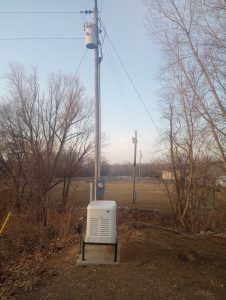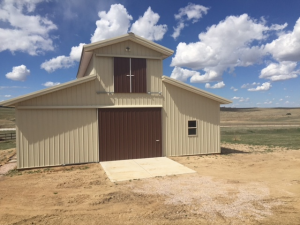If I had a dime for every time, over the last three plus decades, I have had a potential client even bring up using old telephone (utility) poles for constructing a new pole barn, I would be retired and sitting on the beach in Ecuador now!
Pole buildings are designed with the thought of being economical and efficient permanent structures. Given the cost of an average finished pole building, including site work, access improvements, materials, construction, concrete work and utilities being in the neighborhood of $50,000 – it appears those who are investing in them, see them as being permanent improvements as well.
 Utility companies have a huge financial investment in their infrastructure, which includes utility poles. The cost of a pole is far more than the piece of treated timber itself – it includes transportation (from the treatment plant, to the utility company yard, to the installation location), equipment and time to install the pole, as well as regular upkeep and maintenance. With all of these costs, and the pressure to not lose money, utility poles are not normally going to be replaced any earlier in their life cycle than has to be done.
Utility companies have a huge financial investment in their infrastructure, which includes utility poles. The cost of a pole is far more than the piece of treated timber itself – it includes transportation (from the treatment plant, to the utility company yard, to the installation location), equipment and time to install the pole, as well as regular upkeep and maintenance. With all of these costs, and the pressure to not lose money, utility poles are not normally going to be replaced any earlier in their life cycle than has to be done.
A survey of 150 utility companies found the average service life of utility poles to range from 25 to 37 years. The most common reason for replacement being, “strength degradation from ground line decay”. Other reasons for replacement included pole top decay, decay at connections, splitting of pole tops and excessive weathering.
The majority of utility poles are pressure treated with oil based pentachlorophenol (PCP). PCP does not bond with the cells of the wood – and is subject to the forces of gravity. Witness a brand new utility pole; it has a general appearance of being evenly treated for its entire length. Over time, the chemicals are pulled upon by gravity, slowly migrating towards the butt end of the pole (as well as potentially leaching into the ground). When the chemicals become thin enough at the ground line – the pole becomes subject to often rapid decay.
Considering the use of used utility poles for pole barn construction? Think twice, if they outlived their useful life as a power pole in 25 to 35 years, what would lead one to believe they would be effective as supports for a permanent (and often costly) pole building?
While I am at it, see my blog of yesterday….where I discuss the dangers of using PCP treated posts…for anything!










Everything you say makes sense and I agree. What puzzles me is with all this technology we have, how is a pole that is supported below ground obviously over the head of engineers to design something that lasts ? I can’t help but believe it falls under the category of “if it lasts too long we can’t sell replacements”.
Glenn ~ There are pressure treatments (which are not petroleum based) which when used properly, will allow a timber to last pretty much indefinitely
What pressure treatments will last so long?
For structural building columns you want to look for any pressure preservative treatment which has a minimum rating of UC-4B.
Those facts are right on. Treated wood poles should last about 30-40 years with costs of maintenance all the time. Like you said they have full-time workers that are constantly servicing these poles. We are starting to make utility poles out of ductile iron which can last 80+ years. They require no maintenance at all after installation. The industry will move closer to adapt to this technology.
looking for expert authority on life expectancy of wood power pole to hold transformer in Florida.
Your best bet is going to be to talking with your local utility company.
Said the guy who makes money selling new poles. Used ones work fine..the majority of used ones i inspect have no rot at all and some have top rot (just remove).
We don’t sell utility poles, so we have no skin in the game. Utility poles are removed from service for a reason – general it is because they are reaching the end of their safe usable lifespan. In the event you feel comfortable using them, it is certainly your option.
How long is autility pole deep in oil and how long do they last
A brand new properly treated utility pole generally has a service life of 25-37 years.
What is “strength decay from ground line degradation”. I know it seems like a silly question but it is an honest question. I understood it to mean “from the ground wire” on the pole but i wonder if that means the “ground, (as in earth)?
It is ground as in “the Earth”.